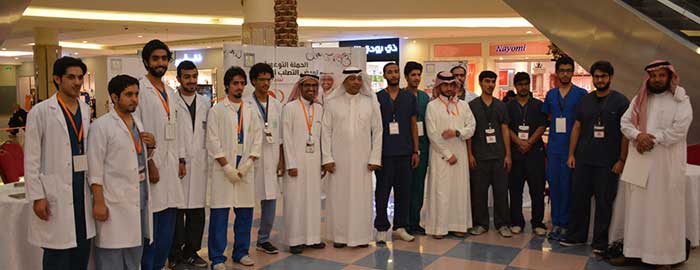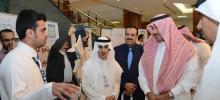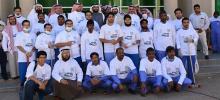University Medical and Pharmacy Schools carried out an awareness campaign called "Sclerotic, there is hope."

A number of Medical and Pharmacy students of King Khalid University have, in collaboration with Positiveness Volunteering Group, carried out a voluntary campaign called "Sclerotic, there is hope." The event was sponsored by King Faisal Medical city in Asir in conjunction with Biogen and G. Pharm companies. The campaign was directed to Sclerosis patients and its aim is to raise awareness in the society, of the disease and its symptoms, and how to deal with it, and how to live with the patients suffering from it.
Multiple Sclerosis is known as the most common neurological diseases worldwide. It affects the Central Nervous System. In such situations, it leads to slowness in signals transmission between nerve cells because of its effect on Myelin sheath.
The campaign targeted a group of people aged 18 to 45, with more prevalence in females. The causes of the Multiple Sclerosis diseases have not been discovered yet, but it is defined as autoimmune, where the immune system begins to attack Myelin sheath, and this leads to its inflammation. Such inflammation results in bad activity to the immune system due to genetic factors interaction, or environmental factors, in addition to other factors being studied, such as a change in body hormones and environmental pollution.
In two days, the campaign targeted multiple sclerosis patients and their families in particular. The first day was in Abha Palace Hotel. The patients and their families were invited to spend a full day with the volunteers to discuss how to deal with the disease and to educate them through presenting experiences of some patients who have taken hope as a path from which they drew success in fighting against this disease. The second day, which was held in Asir Mall witnessed an intensive community awareness highlights of the disease through establishing introductory exhibition, including several stops such as diagnosis corner, awareness corner, in addition to consulting corner.
The Supervisor of the campaign, a Neurosurgery consultant at King Khalid University, Dr. Fawzi Babtain explained that the global campaign was not only directed to patients and their families, but also targeting the public in order to educate them about the disease. He further explain the causes and symptoms of the disease, with an explanation of preventive methods. The Campaign also provided assistance to all, in understanding the disease and in living with it. Dr. Babtain said, "This Disease is widespread, but we are trying to increase awareness of the community through carrying out such campaigns, which will help to the fullest." About the environment of the disease, Dr. Babtain confirmed that 'the disease is usually genetic, not contagious'. Regarding proper treatment, the Consultant explained that 'there is still no drug that eliminates the disease, but there are drugs that could control the activities of the disease at a considerable rate'.
It is noteworthy that the discovery of the treatment of the disease began in 1993 AD, the time saw the control level of the disease reaching 35%. In the last two years, a new treatment has been discovered which could control the disease to up to 80%. This improvement indicates a great and significant development in the treatment of the disease in an effective way.









